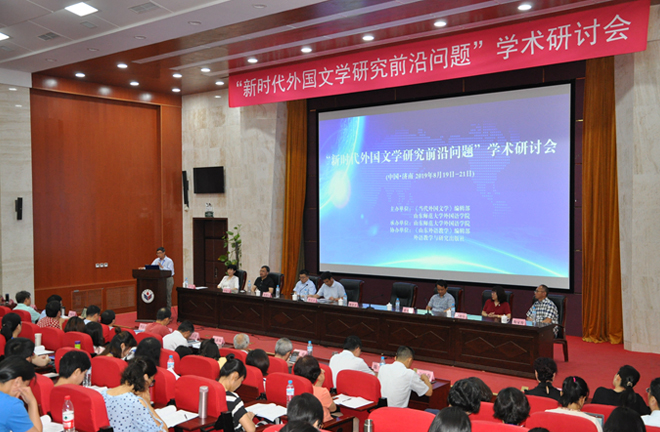Foreign literature studies enters contemporary digital age

Scholars at a symposium on foreign literature studies Photo: SDNU
From Aug. 20 to 21, a symposium on a new age of foreign literature studies was held at Shandong Normal University in Jinan. Scholars held in-depth discussions on such issues as the new orientations of theories in foreign literature criticism and the relation between digital technologies and foreign literature studies.
Against the backdrop of globalization and consumer culture, the form and essence of expression in contemporary foreign literature has obviously changed. Wang Zhuo, dean of the School of Foreign Languages at Shandong Normal University, said that in Swing Time, for example, Zadie Smith transforms the female bildungsroman into a magnificent narration across countries through the protagonist’s trip to Africa, expressing the author’s concern about globalization, multiculturalism and terrorism.
Yang Jincai, dean of the School of Foreign Studies at Nanjing University, said that contemporary foreign literature studies should begin its research with significant works of foreign literature and theoretical perspectives, and it should push ahead with the its going global. On the basis of mutual learning among different cultures, scholars should enrich cultural diversity, embed the historical context of contemporary China and the characteristics of the age into the academic discourse system, and let China’s voice be heard in global academic discourse.
Zeng Yanbing, a professor from the School of Liberal Arts at Renmin University of China, said that, in 2018, we have made great achievements in foreign literature studies in the fields of theoretical research, comparative literature and national literature, with deeper theoretical analysis and broader academic vision. He added that, in terms of research objects, scholars should continuously carry forward the awareness of the interests of the nation and disseminate China’s discourse and image. As regards research themes, scholars should focus on the classics while taking into consideration emerging and marginal cultural phenomena. When it comes to research methods, scholars should concentrate on texts while adopting new theories and methods from related disciplines.
For a long time, Shakespeare studies have been a hot spot in foreign literature studies. Li Zhengshuan, a professor at Hebei Normal University, has conducted statistical analysis on the number of related articles, research themes and authors through quantitative research in bibliometrics, producing a thesis on Shakespeare studies for the database of the China National Knowledge Infrastructure. He found that Shakespeare studies in China have experienced three stages, namely, the primary stage (1934–1990), the boom stage (2000–2009) and the stable stage (2010 until now). He suggested that scholars should do more quantitative research to raise Shakespeare studies to a higher scientific level.
Some scholars held that adopting statistical methods in literature studies was not in accordance with the tradition of the discipline, which can be seen as positivism. Zeng Yanyu, dean of the School of Foreign Studies at Hunan Normal University, said that, as human brains and computers use different methods and focus on different perspectives, the analyses of texts done by humans and computers can be complementary. Scholars can also discover useful research methods to provide new angles for literature studies.
edited by SU XUAN

 PRINT
PRINT CLOSE
CLOSE